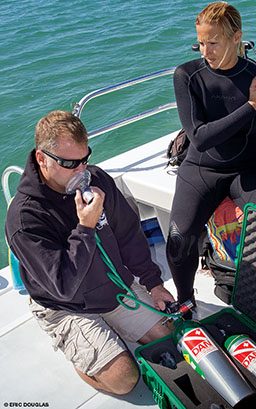The day started just like any other for Capt. Josh Livingston of the DreadKnot, a dive and fishing charter boat out of Destin, Fla. Livingston and three guests had set out into the waters of the Gulf of Mexico with one plan: to freedive and pole-spear some red snapper on day one of the snapper season in federal waters.
After the group had tried one artificial reef spot without success, Livingston moved to a new location 20 miles offshore, where he noticed another group of divers.
“We were over the Belize Queen tugboat about 1,000 feet away from where they were on the Odyssey paddlewheeler,” Livingston said. “When we pulled up I saw their dive flag.”
But before Livingston and his guests had the chance to submerge, a mayday call came over the radio.
“I turned up the volume and heard the exchange and the coordinates; I looked at my plotter and realized the diver in distress was from that boat,” Livingston said. The radio chatter seemed to suggest decompression sickness (DCS).
As a divemaster and certified emergency first responder, Livingston knew the distressed diver needed pure oxygen as soon as possible.
“I got on the radio and asked the crew of the other vessel if they were prepared to deal with this type emergency, and they said they did not have oxygen on board,” he reported. “So I radioed that I did and would be right there.”
In no time, the DreadKnot pulled up alongside the other boat, where its crew of three had positioned the diver in an open space on the deck atop some life jackets for cushioning.
“I hopped on the boat first, and I recognized the injured diver,” Livingston said. He knew the man as an avid local diver in his 50s with 20 years of experience and more than 300 dives.
Because he had prior knowledge of the man’s demeanor, Livingston was better able to assess his condition. “He was out of it, lethargic,” Livingston said. “He is normally very talkative, but he was very quiet and worried. I was told that he had spit up some blood, but I didn’t see that with my own eyes. When I saw him he really didn’t look that bad, but he was definitely lethargic and wasn’t talking much.”
As Livingston began to administer oxygen, he asked the diver what happened.

It was the group’s third dive of the day. They too were spearfishing. Near the end of the dive, the diver got entangled in the wreck when he shot a fish. The paddleboat lies 111 feet below the surface, and Livingston learned that the accident happened close to the time the diver intended to start his ascent.
“He got entangled and ran out of air,” Livingston said, “and the only way he figured he could free himself was to take off his gear, leave it at the bottom and swim to the top.”
Once the diver began breathing oxygen, the next step was to get him safely to shore so he could be given a proper medical evaluation. The boat was in communication with the local Coast Guard station, which was planning to send a boat to retrieve the diver.
“The Coast Guard was going to send a cutter to meet us halfway, so we got under way, but I mentioned to them that it would probably be better to move him to my boat because it was faster,” Livingston explained.
The DreadKnot is an aluminum-chambered boat designed for harbor patrols and Coast Guard operations, so while the recreational dive boat could cruise along at 20 knots, once they moved to Livingston’s boat they would be able to increase the speed to 45 knots.
“We doubled our speed,” he said, adding that during the transition the weather had begun to change. “It was getting rough with two- to three-foot seas, and the rain was coming down.”
As the DreadKnot approached East Pass, leading into Destin, the Coast Guard met them as an escort.
“We fell in behind the cutter under the bridge and then turned to go to the Coast Guard station,” Livingston said.
Once on land, the group was met by the Coast Guard, the police and an ambulance. The injured diver was taken to a local hospital to be assessed and was released the same day with no lasting health problems.
As for Livingston, he said his takeaway from the ordeal is to always be prepared.
“The Coast Guard doesn’t always carry oxygen on their boats; that’s one thing I learned from this,” he said. “There is always an element of risk in diving, and not having oxygen available for emergencies amounts to an additional hazard.”
Today Livingston carries two oxygen units aboard the DreadKnot and has added a defibrillator as well. He said he has no regrets about having to cancel his fishing trip that day, and he chose to refund his clients, all of whom were grateful for the positive outcome.
“We were happy we were in the right place at the right time,” Livingston said. “And we were blessed with great fishing in the days that followed.”
© Alert Diver — Q1 Winter 2016